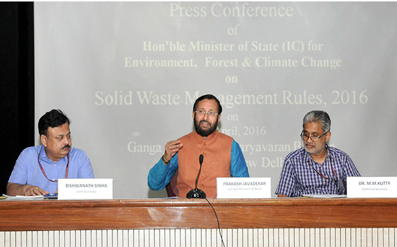 Cleanzine: your weekly cleaning and hygiene industry newsletter 18th April 2024 Issue no. 1110
Cleanzine: your weekly cleaning and hygiene industry newsletter 18th April 2024 Issue no. 1110
Your industry news - first
The original and best - for over 20 years!
We strongly recommend viewing Cleanzine full size in your web browser. Click our masthead above to visit our website version.
India revises its solid waste management rules
 The Environment Ministry of India has revised its Solid Waste Management Rules after 16 years, to encourage citizens to do something to prevent the waste to wealth by following 'recovery, reuse and recycle' principles wherever possible.
The Environment Ministry of India has revised its Solid Waste Management Rules after 16 years, to encourage citizens to do something to prevent the waste to wealth by following 'recovery, reuse and recycle' principles wherever possible.
The rules are now far more widely applicable; extending beyond municipal areas and into urban agglomerations, census towns, notified industrial townships, areas under the control of Indian Railways, airports, airbases, ports and harbours, defence establishments, special economic zones, State and Central government organisations as well as places of pilgrims, religious & historical importance.
Waste will have to be segregated in to three streams, Wet (biodegradable), Dry (plastic, paper, metal, wood, etc.) and domestic hazardous wastes (nappies, napkins, empty containers of cleaning agents, mosquito repellents, etc.) before being handed to authorised rag-pickers or waste collectors or local bodies.
No one is allowed to throw, burn, or bury their solid waste on streets, open public spaces outside their premises, or in the drains or water bodies.
Waste generators will have to pay a 'user fee' to waste collectors and could be given a 'spot fine' for littering and non-segregation of waste.
Used sanitary waste such as nappies and sanitary pads will have to be wrapped securely in pouches provided by manufacturers or brand owners of these products or in a suitable wrapping material and be placed in with the dry/non- bio-degradable waste.
Addressing the press, Prakash Javadekar, Environment Minister, stated that waste processing facilities will be set up by all local bodies within three years, with those having populations of 1m or more having to do so within two years.
The Government has also constituted a Central Monitoring Committee under the chairmanship of Secretary, Ministry of Environment, Forest and Climate Change to monitor the overall implementation of the rules.
21st April 2016







